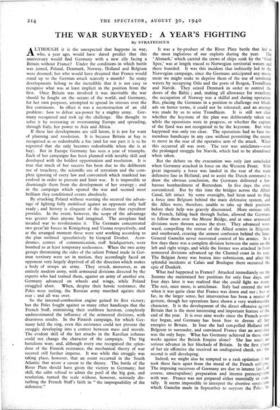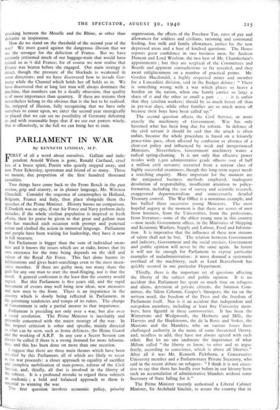THE WAR SURVEYED : A YEAR'S FIGHTING
By STRATEGICUS
ALTHOUGH it is the unexpected that happens in war, who, a year ago, would have dared predict that this anniversary would find Germany with a new ally facing a Britain without France? Under the conditions in which battle was joined, Poland, Denmark, Norway, Holland and Belgium were doomed; but who would have dreamed that France would stand up to the German attack scarcely a month? So many developments belong to the incredible that it is not easy to recognise what was at least implicit in the position from the first. Once Britain was involved it was inevitable the war should be fought on the oceans of the world; and Germany, for her own purposes, attempted to spread its stresses over the five continents. In effect it was a reconstruction of an old problem : how to defeat sea-power by a mighty army. Ger- many recognised and took up the challenge. She thought to solve it by overawing or overrunning Europe and spreading, through Italy, her power to Asia and Africa.
If these last developments are still latent, it is not for want of planning and resolution. It is because Britain at bay is recognised as so redoubtable a foe (and for our part it is to be regretted that she only becomes redoubtable when she is at bay). But in Europe Germany has seen a year of triumphs.
Each of her campaigns has been planned with notable skill and developed with the boldest opportunism and resolution. It is true that much of her success has been due to the deliberate use of treachery, the scientific use of terrorism and the com- plete ignoring of every law and convention which mankind has evolved in order to prevent and limit war. It is impossible to disentangle them from the development of her strategy ; and in the campaign which opened the war and seemed most brilliant they conditioned events absolutely.
By attacking Poland without warning she secured the advan- tage of fighting fully mobilised against an opponent only half ready ; and history is eloquent of the chances that expedient provides. In the event, however, the scope of the advantage was greater than anyone had imagined. The aeroplane had invaded war to revolutionise it. The Germans concentrated two great'air forces in Konigsberg and Vienna respectively, and at the arranged moment these were sent working according to the plan outlined speculatively by General Douhet. Aero- dromes, centres of communication, staff headquarters, were bombed to at least temporary uselessness. When the two army groups threatening the sides of the salient Poland made in Ger- man territory were set in motion, they accordingly faced an opponent very largely deprived of all the direction which makes a body of troops an army. They struck, moreover, as an entirely modern army, with armoured divisions directed by the experts who had trained them, against an army of another era. Germany advanced on wheels and wings, while Poland struggled afoot. When, despite their heroic resistance, the Poles were reeling, the Russian army marched against their rear ; and all was over.
So the internal-combustion engine gained its first victory; but the Poles fought against so many other handicaps that the French Staff, minimising their stubborn heroism, completely underestimated the influence of the armoured divisions, with disastrous results. In the Finnish campaign, for which Ger- many held the ring, even this assistance could not prevent the struggle developing into a contest between mass and morale. The evident skill of the last attacks in the Karelian isthmus could not change the character of the campaign. The big battalions won; and, although every one recognised the splen- dour of the Finnish resistance, the mechanical theory of war secured still further impetus. It was while this struggle was taking place, however, that an event occurred in the South Atlantic that wrote a caveat to the theory. The battle of the River Plate should have given the victory to Germany; but skill, the calm refusal to admit the peril of the big gun, and resolution, turned the scale without, however, seriously dis- turbing the French Staff's faith in " the impregnability of the defensive." It was a by-product of the River Plate battle that led le the most inglorious of our exploits during the year. The Altmark,' which carried the crews of ships sunk by the ' Graf Spec,' was at length traced to Norwegian territorial waters and there boarded. It was this incident that indirectly led to the Norwegian campaign, since the Germans anticipated any move- ment we might make to deprive them of the use of territorial waters by occupying Oslo and the ports of Bergen, Trondhjem and Narvik. They seized Denmark in order to control the doors of the Baltic ; and, making all allowance for treachery, the occupation of Norway was a skilful and daring operation. But, placing the Germans in a position to challenge our block- ade on better terms, it could not be tolerated; and an attempt was made by us to seize Trondhjem. It is still not clear whether the keystone of the plan was deliberately taken out while the operations were in progress, or whether the capture of the fjord was not recognised to be the keystone. But what happened was only too clear. The operations had to face tre- mendous handicaps in any case without permitting the enemy to move in the rear of the operative arm of the attack. When this occurred all was over. The rest was anticlimax—even the prolonged struggle for Narvik, which had to be abandoned when taken.
But the debate on the evacuation was only just concluded when Germany attacked in force on the Western Front. With great ingenuity a force was landed in the rear of the main defensive line in Holland; and to assist the Dutch command to draw the obvious conclusion, the Germans delivered a bar- barous bombardment of Rotterdam. In five days the army surrendered. But by this time the bridges across the Albert Canal, left intact by some oversight, had been used to fling a force into Belgium behind- the main defensive system, and the Allies were, therefore, unable to take up their positions before their help was gravely discounted. More serious still, the French, falling back through Sedan, allowed the Germans to follow them over the Meuse Bridge, and at once armoured divisions were thrown across the river. They advanced west- ward, compelling the retreat of the Allied armies in Belgium. and southward, creating the utmost confusion behind the lines. General Gamelin never recovered control of his armies. In a few days there was a complete division between the units on the left and right wings, and while the former was attacked in front armoured divisions advanced up the Channel coast in its rear. The Belgian Army was beaten into submission, and after the splendid incidents at Calais and Boulogne there occurred the epic of Dunkirk.
What had happened to France? Attacked immediately on the Somme she maintained her positions for only four days. and four days later it was realised that she could fight no more. The rest, once more, is anticlimax. Italy had entered the war when it was quite clear that France was down and out ; but so far, in the larger sense, her intervention has been a matter of gesture, though her operations have shown a very workmanlike character. It is the development of the direct offensive against Britain that is the most interesting and important feature of the end of the year. It is over nine weeks since the Frenth armis- tice began, and Germany has been free to devote all her energies to Britain. In four she had compelled Holland and Belgium to surrender, and convinced France that an armistice was the only hope. What has Germany achieved in these nine weeks against the British Empire alone? She has made no serious advance in her blockade of Britain. In the first phase of her air offensive she received an undisguised check, and the second is still developing.
Indeed, we might also be tempted to a rash optimism if we took these facts apart from the moral of the French collapse. The imposing successes of Germany are due to intense (and, of course, unscrupulous) preparation and intense preoccupati° with war. France was not prepared either materially or men' tally. It seems impossible to interpret the abortive operations which Gamelin made in September to support the Poles. by attacking between the Moselle and the Rhine, as other than defeatist in inspiration.
How do we stand on the threshold of the second year of the war? We must guard against the dangerous illusion that we are the stronger for the defection of France. But we have certainly jettisoned much of our baggage-train that would have ruined us as it did France; for of course we now realise that France was beaten before she engaged. Our main strategy is intact, though the pressure of the blockade is weakened in some directions; and we have discovered how to invade Ger- many while the Channel which holds her off holds us in. We have discovered that at long last man will always dominate the machine, that numbers can be a deadly obsession, that quality is of more importance than quantity. If these are truisms they nevertheless belong to the obvious that is the last to be realised. So, stripped of illusion, fully recognising that we have only ourselves to count upon, we enter the second year strategically so placed that we can see no possibility of Germany defeating us and with reasonable hope that if we use our powers wisely, that is offensively, to the full we can bring her to ruin.



























 Previous page
Previous page